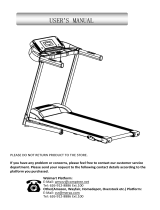
Using a Heart Rate Transmitter
How to wear your wireless chest strap transmitter: How to wear your wireless chest strap transmitter:
1. Attach the transmitter to the elastic strap using the locking parts. 1. Attach the transmitter to the elastic strap using the locking parts.
2. Adjust the strap as tightly as possible as long as the strap is not too tight to remain
comfortable.
2. Adjust the strap as tightly as possible as long as the strap is not too tight to remain
comfortable.
3. Position the transmitter with the SOLE logo centered in the middle of your body facing away
from your chest (some people must position the transmitter slightly left of center). Attach the final
end of the elastic strap by inserting the round end and, using the locking parts, secure the
transmitter and strap around your chest.
3. Position the transmitter with the SOLE logo centered in the middle of your body facing away
from your chest (some people must position the transmitter slightly left of center). Attach the final
end of the elastic strap by inserting the round end and, using the locking parts, secure the
transmitter and strap around your chest.
4. Position the transmitter immediately below the pectoral muscles. 4. Position the transmitter immediately below the pectoral muscles.
5. Sweat is the best conductor to measure very minute heart beat electrical signals. However,
plain water can also be used to pre-wet the electrodes (2 black square areas on the reverse side
of the belt and either side of transmitter). It’s also recommended that you wear the transmitter
strap a few minutes before your work out. Some users, because of body chemistry, have a more
difficult time in achieving a strong, steady signal at the beginning. After “warming up”, this
problem lessens. As noted, wearing clothing over the transmitter/strap doesn’t affect
performance.
5. Sweat is the best conductor to measure very minute heart beat electrical signals. However,
plain water can also be used to pre-wet the electrodes (2 black square areas on the reverse side
of the belt and either side of transmitter). It’s also recommended that you wear the transmitter
strap a few minutes before your work out. Some users, because of body chemistry, have a more
difficult time in achieving a strong, steady signal at the beginning. After “warming up”, this
problem lessens. As noted, wearing clothing over the transmitter/strap doesn’t affect
performance.
6. Your workout must be within range - distance between transmitter/receiver – to achieve a
strong steady signal. The length of range may vary somewhat but generally stay close enough
to the console to maintain good, strong, reliable readings. Wearing the transmitter immediately
against bare skin assures you of proper operation. If you wish, you may wear the transmitter
over a shirt. To do so, moisten the areas of the shirt that the electrodes will rest upon.
6. Your workout must be within range - distance between transmitter/receiver – to achieve a
strong steady signal. The length of range may vary somewhat but generally stay close enough
to the console to maintain good, strong, reliable readings. Wearing the transmitter immediately
against bare skin assures you of proper operation. If you wish, you may wear the transmitter
over a shirt. To do so, moisten the areas of the shirt that the electrodes will rest upon.
Note: The transmitter is automatically activated when it detects activity from the user’s heart.
Additionally, it automatically deactivates when it does not receive any activity. Although the
transmitter is water resistant, moisture can have the effect of creating false signals, so you
should take precautions to completely dry the transmitter after use to prolong battery life
(estimated transmitter battery life is 2500 hours). The replacement battery is Panasonic
CR2032.
Note: The transmitter is automatically activated when it detects activity from the user’s heart.
Additionally, it automatically deactivates when it does not receive any activity. Although the
transmitter is water resistant, moisture can have the effect of creating false signals, so you
should take precautions to completely dry the transmitter after use to prolong battery life
(estimated transmitter battery life is 2500 hours). The replacement battery is Panasonic
CR2032.
Erratic Operation: Erratic Operation:
Caution! Do not use this treadmill for Heart Rate Control unless a steady, solid Actual
Heart Rate value is being displayed. High, wild, random numbers being displayed
indicate a problem.
Caution! Do not use this treadmill for Heart Rate Control unless a steady, solid Actual
Heart Rate value is being displayed. High, wild, random numbers being displayed
indicate a problem.
Areas to look for on interference: Areas to look for on interference:
(1) Treadmill not properly grounded - A must! (1) Treadmill not properly grounded - A must!
(2) Microwave ovens, TV’s, small appliances, etc. (2) Microwave ovens, TV’s, small appliances, etc.
(3) Fluorescent lights. (3) Fluorescent lights.
(4) Some household security systems. (4) Some household security systems.
(5) Perimeter fence for a pet. (5) Perimeter fence for a pet.
(6) The antenna that picks up your heart rate is very sensitive. If there is an outside noise
source, turning the whole machine 90 degrees may de-tune the interference.
(6) The antenna that picks up your heart rate is very sensitive. If there is an outside noise
source, turning the whole machine 90 degrees may de-tune the interference.
(7) If you continue to experience problems contact your dealer. (7) If you continue to experience problems contact your dealer.
WARNING! WARNING!
DO NOT USE THE HEART RATE CONTROL PROGRAM IF YOUR HEART RATE IS NOT
REGISTERING PROPERLY ON THE TREADMILL’S DISPLAY!
DO NOT USE THE HEART RATE CONTROL PROGRAM IF YOUR HEART RATE IS NOT
REGISTERING PROPERLY ON THE TREADMILL’S DISPLAY!
S73 / S77
16
S73 / S77
16


























